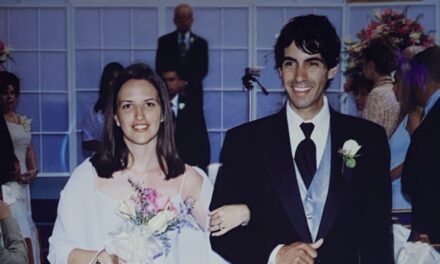The music thundering through the speakers is a powerful mixture of traditional Arab rhythm, unflinching rap, and thundering base, and it resonates you to your core. Then the drums hit, pounding, overlaid by scintillating, lightning-quick and utterly precise Arabic rap—you can’t help but move along to the beat. Whether or not you speak Arabic, the emotions in the artists’ voices translate themselves.
The band is DAM (دام), the first ever Palestinian hip hop crew and one of the first groups to rap in Arabic. True to their name, which means “everlasting,” DAM has steadily grown and maintained a monumental status in the music world since the mid 90s. Made up of Tamer Nafar, Suhell Nafar, Mahmood Jrere, and Maysa Daw (who joined in 2015), the group drew their foundational inspiration from Tupac and the resemblance between Lydda—the neighborhood they grew up in—and the streets featured in his videos.
DAM is known for its unwavering political statements in its lyrics, which tackle everything from women’s rights to the pressure to marry, from western colonization and interference in the Middle East to the Israeli occupation, and the group’s newest album, Ben Haana Wa Maana (بين حانة ومانة) has been described as their most provocative and socially-engaged yet. This doesn’t mean it makes for hard listening, though, on the contrary: as Nafar says, “You can dance to the drums of revolution.”
One of DAM’s most famous songs, and the last track on their new album, “Jasadik-Hom” (جسدكهم””), meaning “Your Body of Theirs,” discusses the intense scrutiny that the female body is subjected to by the male gaze.
Lead vocalist Daw reminds us, first in a resigned, exhausted tone, and then in a triumphant one, that, as a woman, moreover, as an Arab woman, “Even in the struggle I have double your responsibilities/ If you resist you hurt their Zionism/ If I resist I also hurt their masculinity.”
“حتى بالنضال عندي اضعاف من مسؤوليتكم/
إذا انت بتقاوم بتمس في صهيونيتهم/
إذا انا بقاوم بمس كمان بذكوريتهم”
Her lyrics highlight the intersectional oppression that Palestinian women are subjected to, and help to draw the attention of an international audience to two issues which often fall on deaf ears.
DAM is equally quick to point out, however, that misogyny is not simply a Middle Eastern issue, but a universal one, stating, in their song “Prozac” (بروزاك), “Hypocrisy, chauvinism is not a Middle Eastern but a male thing, everyone has a role/ I will deal with the honor killings and you deal with your porn industry.”
“نفاق، الشوفينية مش شرقية بل ذكورية، كل واحد ودورو / انا بعالج قضية الشرف وانت عالج عندكم صناعة ال “پورنو””
The themes of their music are relevant and personal no matter where you’re listening from, as evident from their thousands of fans who stream their music across the globe each month.
Despite the tough topics and harsh realities that DAM touches on throughout their work, they nonetheless remain hopeful. Their song, “Hada Yidi’e Sitna” (“حدا يدعي ستنا”) claims, “This is not the darkness of a tomb, we are in the darkness of a womb” (“هاي مش عتمة تابوت انت في عتمة رحم”), suggesting rebirth from dark times rather than resignation and defeat. DAM’s message of hope in the face of oppression is something we can all draw on, fighting towards a more equal future.
The next time that you’re feeling down, be it from prolonged lockdown, work pressures, or societal pressures, pop on Ben Haana Wa Maana—or any other album from DAM’s impressive and varied discography—and listen through. You’re sure to be at once transported away from your struggles by the intoxicating beat and lifted up by the drums of revolution.
DAM reminds us to fight for what we believe in, and that a band from Palestine can go from recording songs on their home computer using premade hip hop instrumentals as backup to speaking out as one of the principal political voices of not only the Palestinian cause, but of a variety of modern social and political struggles, in the music industry today.





